|
|
|
Sort Order |
|
|
|
Items / Page
|
|
|
|
|
|
|
| Srl | Item |
| 1 |
ID:
060654
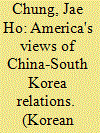

|
|
|
| 2 |
ID:
089394
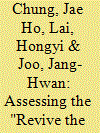

|
|
|
|
|
| Publication |
2009.
|
| Summary/Abstract |
This article, focusing on the "revive the northeast" programme, examines four questions: why was the northeast region selected as yet another macro-site for Beijing-endorsed scheme of regional development; how does it differ from the "develop the west" scheme; what does the "revive the northeast" scheme entail in concrete policy terms; and how can we assess the impact of this scheme on the region's economic development? While it offers a relatively positive assessment of the programme's impact in facilitating a faster growth during 2004-06, future challenges are also noted for a sustainable development of the northeast region as a whole.
|
|
|
|
|
|
|
|
|
|
|
|
|
|
|
|
| 3 |
ID:
089422
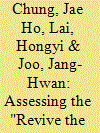

|
|
|
|
|
| Publication |
2009.
|
| Summary/Abstract |
This article, focusing on the "revive the northeast" programme, examines four questions: why was the northeast region selected as yet another macro-site for Beijing-endorsed scheme of regional development; how does it differ from the "develop the west" scheme; what does the "revive the northeast" scheme entail in concrete policy terms; and how can we assess the impact of this scheme on the region's economic development? While it offers a relatively positive assessment of the programme's impact in facilitating a faster growth during 2004-06, future challenges are also noted for a sustainable development of the northeast region as a whole.
|
|
|
|
|
|
|
|
|
|
|
|
|
|
|
|
| 4 |
ID:
075939
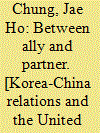

|
|
|
|
|
| Publication |
New York, Columbia University Press, 2007.
|
| Description |
xii, 185p.
|
| Standard Number |
0231139063
|
|
|
|
|
|
|
|
|
|
|
|
Copies: C:1/I:0,R:0,Q:0
Circulation
| Accession# | Call# | Current Location | Status | Policy | Location |
| 052153 | 327.5195051/CHU 052153 | Main | On Shelf | General | |
|
|
|
|
| 5 |
ID:
046924
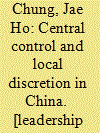

|
|
|
|
|
| Publication |
Oxford, Oxford University Press, 2000.
|
| Description |
xii, 207p.
|
| Standard Number |
0198297777
|
|
|
|
|
|
|
|
|
|
|
|
Copies: C:1/I:0,R:0,Q:0
Circulation
| Accession# | Call# | Current Location | Status | Policy | Location |
| 044238 | 338.1851/CHU 044238 | Main | On Shelf | General | |
|
|
|
|
| 6 |
ID:
052409
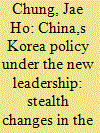

|
|
|
|
|
| Publication |
Spring/Summer 2004.
|
|
|
|
|
|
|
|
|
|
|
|
|
|
|
|
| 7 |
ID:
145246


|
|
|
|
|
| Summary/Abstract |
With the world’s largest population and fourth largest territory, China’s size renders it difficult to govern. The degree to which the Communist Party has for years prioritized the task of “maintaining stability” (weiwen) is a key testimony to the potential fragility of the regime. A principal question that logically follows is: what keeps the regime from falling apart? This article surveys a range of instruments that the central government has deployed both historically and today in efforts to govern China’s centrifugal localities. Seven dimensions of control—ideological-normative, institutional, resource-allocative, personnel management, administrative monitoring, powers over key local sectors, and military force—are examined to assess the center’s adaptive capacity in local governance.
|
|
|
|
|
|
|
|
|
|
|
|
|
|
|
|
| 8 |
ID:
089516
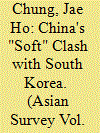

|
|
|
|
|
| Publication |
2009.
|
| Summary/Abstract |
South Korea's mode of responding to the rise of China is not fixed but continues to evolve. The recent clash over Koguryo historiography provides a sobering example of how easily the symbiotic relationship can be abruptly interrupted. It shows the need for careful management of the bilateral relationship by both Seoul and Beijing.
|
|
|
|
|
|
|
|
|
|
|
|
|
|
|
|
| 9 |
ID:
130416
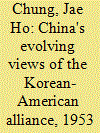

|
|
|
|
|
| Publication |
2014.
|
| Summary/Abstract |
This article reconstructs an ideational trajectory in which China's views of the Korean-American alliance evolved during the last 60 years. The article first surveys China's general policy toward alliance and alliance-making. The article then traces the evolutionary path of Chinese views in the following four periods: (1) the Cold War era (1950s-1960s); (2) transformative years (early 1970s-mid-1990s); (3) the period of a strained alliance (late 1990s-late 2000s); and (4) an era of great reversal (late 2000s-present). Principally, the article suggests that China's view of the Korean-American alliance was intense antagonism during the Cold War era, although it was significantly watered down during the transformative years of Sino-South Korean rapprochement. With the normalization of relations between Beijing and Seoul in 1992 and a decade of progressive rule (1998-2007) in South Korea, China's view encompassed some wishful thinking about a gradually diluted alliance. The strong comeback of the conservatives in South Korean politics since 2008, however, shattered such optimism and re-awoke Beijing to some cold realities. China's view of the Korea-American alliance may grow more negative in tandem with US-China relations, irrespective of the official rhetoric of sovereignty regarding alliance and alliance-making.
|
|
|
|
|
|
|
|
|
|
|
|
|
|
|
|
| 10 |
ID:
107160
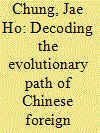

|
|
|
|
|
| Publication |
2011.
|
| Summary/Abstract |
Chinese foreign policy has made a grand transition during the post-Mao reform era. Chinese foreign policy of the 21st century has become much more open and pragmatic in its relations with the outside world, more extensive in its reach and coverage, highly diversified in its functions and partners, more committed to international norms than before, and much more sophisticated in its dealing with the international community. Yet, the precise balance between the changes and continuities is still quite difficult to gauge. Furthermore, despite crucial visible changes, concerns and worries - even some fears - are discernible with regard to the rise of China. In the last 60 years, Beijing has sought hard to sustain consistencies (shizhong ruyi) in its foreign policy. Perhaps, that is the best clue the world has in inferring the future trajectory of Chinese foreign policy.
|
|
|
|
|
|
|
|
|
|
|
|
|
|
|
|
| 11 |
ID:
107177
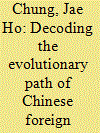

|
|
|
|
|
| Publication |
2011.
|
| Summary/Abstract |
Chinese foreign policy has made a grand transition during the post-Mao reform era. Chinese foreign policy of the 21st century has become much more open and pragmatic in its relations with the outside world, more extensive in its reach and coverage, highly diversified in its functions and partners, more committed to international norms than before, and much more sophisticated in its dealing with the international community. Yet, the precise balance between the changes and continuities is still quite difficult to gauge. Furthermore, despite crucial visible changes, concerns and worries - even some fears - are discernible with regard to the rise of China. In the last 60 years, Beijing has sought hard to sustain consistencies (shizhong ruyi) in its foreign policy. Perhaps, that is the best clue the world has in inferring the future trajectory of Chinese foreign policy.
|
|
|
|
|
|
|
|
|
|
|
|
|
|
|
|
| 12 |
ID:
092203
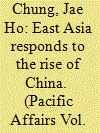

|
|
|
|
|
| Publication |
2009-2010.
|
| Summary/Abstract |
How is East Asia responding to the rising China? Pertinent literature suggests that explicit balancing or containment has been rare and engagement, if not appeasement, appears to be East Asia's modus operandi. Yet, this study argues that certain, though subtle, variations are nevertheless discernible among the regional states in their responses to China's ascent. Focusing on 15 East Asian states for the period of 2004-2007, the article first presents a bird's-eye view of East Asia's responses to the rise of China. More specifically, inter-state variations are empirically demonstrated and four principal patterns-bandwagoning, hesitant hedging, active hedging and balancing-are distilled from the key responses of these 15 nations. The article then examines the sources of these inter-state variations, and argues that they are conditioned largely by three factors: alliances with the United States, regime characteristics and territorial disputes with China. The article concludes with some observations as to East Asia's complex responses to the rise of China and their security implications for the region as a whole.
|
|
|
|
|
|
|
|
|
|
|
|
|
|
|
|
| 13 |
ID:
192074
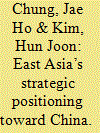

|
|
|
|
|
| Summary/Abstract |
Relatively few systematic and categorical studies have been conducted on the variant responses by East Asian states to the rise of China, and even fewer dealt with reasons for such intra-regional variations. This study seeks to fill the void by examining the strategic responses by 15 East Asian states for the period of 2011–2016. This period merits close scrutiny because China became more explicitly assertive. The research proceeds in two phases. First, by way of reading into the expert assessments in academic journals, the strategic responses of the 15 states are categorised into balancing, hedging, or bandwagoning. Second, statistical analyses are conducted to see how the intra-regional variations are related to unit-level factors. Of the seven variables analyzed, three – geographical proximity, democracy, and identity – turn out to be crucial in determining the East Asian states’ strategic responses.
|
|
|
|
|
|
|
|
|
|
|
|
|
|
|
|
| 14 |
ID:
052526
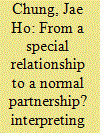

|
|
|
|
|
| Publication |
Winter 2003-04.
|
|
|
|
|
|
|
|
|
|
|
|
|
|
|
|
| 15 |
ID:
177649
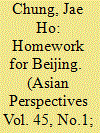

|
|
|
|
|
| Summary/Abstract |
This analysis observes that in 2020 China is a global power with global ambitions and a near-global presence. Terms
such as “G2,” “global stakeholder,” “strategic competitor,”
and “hegemonic candidate” no longer ring hollow as they
did ten years ago. However, it is unclear whether China’s
challenge to the United States will be sustainable in the medium to long run. The essay considers five hurdles in Beijing’s
path to a “responsible great power”—assuming that China
does hope to be one. Certainly, the world does not wish to
see the emergence of an irresponsible China.
|
|
|
|
|
|
|
|
|
|
|
|
|
|
|
|
| 16 |
ID:
165151
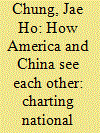

|
|
|
|
|
| Summary/Abstract |
Based on the premise that perception operates either as a catalyst or a constraint for a hegemonic war, this study examines ‘national perceptions’ (i.e. how the citizens of the two states view each other) and ‘official views’ (i.e. how the two governments perceive each other) between the US and China of the post-Cold War period. As for the national views, (1) American perceptions of China have generally become more negative than Chinese perceptions of America; (2) little congruence is found between the two powers on key values and norms; and (3) perceptions are generally getting far ahead of the realities. As for the official views, formal documents do not fully reveal their real state of minds. Diplomatic courtesy and strategic self-esteem runs through them. Yet, America’s strategic concern and growing will to manage China from a position of strength is increasingly more discernible. From the Chinese documents, on the other hand, signs of inferiority have gradually disappeared. In sum, perceptions between the two are working more as a catalyst for strategic competition than a constraint on it.
|
|
|
|
|
|
|
|
|
|
|
|
|
|
|
|
| 17 |
ID:
073379
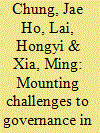

|
|
|
|
|
| Publication |
2006.
|
| Summary/Abstract |
With the further intensification of transitional reforms, the level of social instability in China has been rising unabated since the 1990s, calling overall governance into serious question. This study surveys three dimensions of instability in China - "collective public security incidents" (CoPSI), "unofficial" religious groups, and the expanding criminal networks - and explores the patterns of their regional distribution and the possibility of interconnectedness among the three. This study finds that both urban and rural protests have increased in frequency, expanded in size, diversified in terms of their participants' backgrounds, enlarged in geographical coverage, lasted longer and displayed higher levels of violence. The research also finds that economically stagnant central provinces of Henan, Hubei, Hunan and Sichuan are particularly vulnerable to instability. Furthermore, collective protests are gradually forming lateral linkages among different localities, religious sects and criminal organizations. Granted that discontents alone would not alter the political landscape, they can still serve as a strong catalyst to prod the Chinese state to search for effective solutions. While the state is not in an imminent danger of collapse, continuing instability is more likely than otherwise.
|
|
|
|
|
|
|
|
|
|
|
|
|
|
|
|
| 18 |
ID:
064966
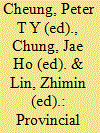

|
|
|
|
|
| Publication |
London, M E Sharpe, 1998.
|
| Description |
466p.
|
| Series |
Studies on contemporary China
|
| Standard Number |
0765601478
|
|
|
|
|
|
|
|
|
|
|
|
Copies: C:1/I:0,R:0,Q:0
Circulation
| Accession# | Call# | Current Location | Status | Policy | Location |
| 050092 | 338.951009049/CHE 050092 | Main | On Shelf | General | |
|
|
|
|
| 19 |
ID:
123107
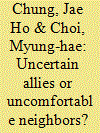

|
|
|
|
|
| Publication |
2013.
|
| Summary/Abstract |
This study is based upon two premises: (1) the available literature, though voluminous, fails to provide systematic understandings of the complex and evolving relations between China and North Korea; and (2) China and North Korea had been short of being trusted allies bound in blood and belief even before the launch of post-Mao reforms and the normalization of Beijing-Seoul relations. This article dissects this curious relationship into four questions: (1) What does history inform us about China's relations with (North) Korea? (2) Has China communicated effectively with North Korea? (3) Have China and North Korea been 'trusted allies'? (4) How effective has China been in inducing North Korea to comply with its demands over the years? The authors argue that, geo-strategically, China can hardly afford to put North Korea in an adversarial position. Furthermore, residues of the Factional Incident of 1956 and North Korea's deep-rooted suspicion of China still linger on. These have been the sources of Beijing's dilemma in consistently opting for 'soft' measures despite that North Korea's provocative acts and nuclear weapons programs have negatively affected China's interests. From the outset, China and North Korea had been more uncertain allies who had to cooperate with each other under the ideological and geopolitical imperatives of the difficult times. The authors also suggest that it would be misleading to put Sino-North Korean dynamics in a usual category of big power-small nation relations where power asymmetry generally works against the latter. North Korea has undoubtedly been an atypical 'small nation'. It is due to these limitations that China's pressurizing has not been always effective and that Beijing's reactions have been continuously cyclical. This cyclical trend is not likely to be broken since the upcoming drama of Sino-American rivalry is bound to close the window of such opportunities for China, which will nevertheless regard North Korea increasingly as a liability, if not uncomfortable neighbor.
|
|
|
|
|
|
|
|
|
|
|
|
|
|
|
|
|
|
|
|
|